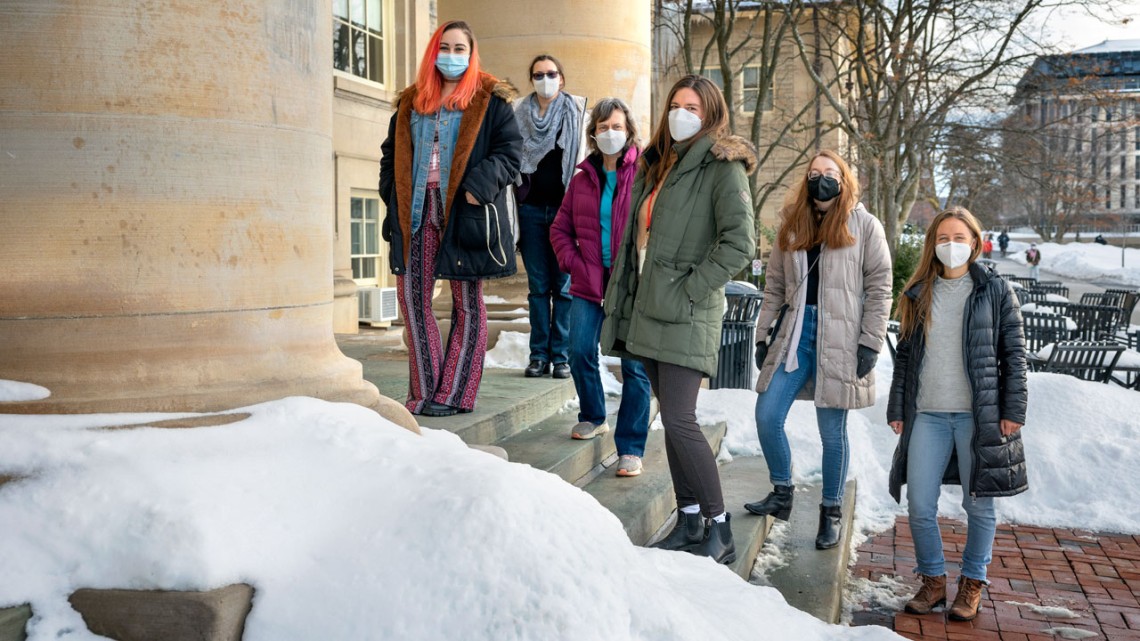
From left, Ari Broad, Rachael Skye, Beth Rhoades, Scarlett Lee, Kara Rode Webber and Kara Fikrig are all part of the Vaccination Conversations with Scientists group.
Volunteer scientists change opinions about vaccines
By Krishna Ramanujan
Vaccination Conversations with Scientists (VaCS), a group of more than 100 Cornell student, staff and faculty volunteers educating the public about the safety and effectiveness of vaccines, is reporting success in shifting unvaccinated people’s beliefs about the shots.
VaCS volunteers have made more than 3,000 outreach phone calls in Tompkins and surrounding counties since the group was founded by entomology doctoral student Kara Fikrig in May 2021. The group reports that 29% of unvaccinated people contacted self-reported an increase in their willingness to be vaccinated (on a scale of 1 to 5) after talking with a VaCS volunteer.
The group has also canvassed door-to-door, held 19 tabling events and five Q&A sessions at a local brewery, a church, a music event, a fair and at a library. Volunteers have crafted messages with the help of faculty across Cornell’s campuses, and are working with the Tompkins County Health Department and other upstate counties to counter misinformation about the safety of COVID vaccines.
“There are so many reasons that people remain unvaccinated – mostly connected to some form of misinformation – and it has been surprising to see how our conversations can actually change people’s opinions,” Fikrig said. Other key graduate students who have steered VaCS include Andy Sanchez (chemical and biomolecular engineering); Kara Rode Webber (biochemistry, molecular and cell biology); and Katerina Roth (food science).
Fikrig floated her idea of conversations between Cornell scientists and community members to tackle vaccine hesitancy at a meeting of Advancing Science and Policy, a Cornell student group that promotes student involvement in science policy advocacy, where she serves as secretary. Her idea was met with enthusiastic approval and VaCS was born.
Once formed, the Tompkins County Health Department became the group’s first collaborator by offering to include VaCS volunteers in their pop-up clinics and tabling events. “The tabling sessions that have been paired with pop-up clinics have been some of the most satisfying events,” Fikrig said. “You can see how the impact of a conversation directly translates into someone’s decision to get vaccinated right then and there.”
The next step was to secure funding. The student leaders sent a proposal to Provost Michael Kotlikoff, who replied with generous support, in 2021 and continuing into 2022. “Without his support, the initiative would have floundered before it even began,” Fikrig said. The provost’s initial funding was followed by support from the David M. Einhorn Center for Community Engagement.
With the help of Dr. Susana Morales, associate professor of clinical medicine at Weill Cornell Medicine who leads a Cornell Vaccine Ambassadors training program through the Cornell Center for Health Equity, VaCS leaders crafted a program to train volunteers about vaccines, SARS-CoV-2 and how to communicate, especially with people who hold opposing views.
The group has compiled lists of resources and studies related to COVID-19 and matched that information with potential questions from the public. A number of faculty advisors have served on live expert panels that were provided as part of the trainings and they have helped inform a training document for volunteers that is now close to 40 pages and is continuously updated. Volunteers have prioritized listening and explaining complicated concepts in layperson terms.
“Our volunteers are really the driving force behind VaCS,” Webber said. “We couldn’t make as wide of an impact without people taking the time to make calls, stand at booths, go door-to-door and work behind the scenes.”
VaCS has collaborated with the Rural Equity Workgroup, a coalition that conducts rural vaccine outreach across eight counties, and in that capacity, VaCS has informed people about upcoming pop-up vaccine clinics and other events during phone-bank sessions.
“Having these conversations with people has helped me to understand the depth of some people’s concerns about their own health – they’ve heard misinformation about the vaccine and they are simply trying to keep themselves and their families safe,” Fikrig said.
This year, VaCS is working to recruit and train more volunteers and expand the initiative to reach more counties in upstate New York.
Media Contact
Get Cornell news delivered right to your inbox.
Subscribe

